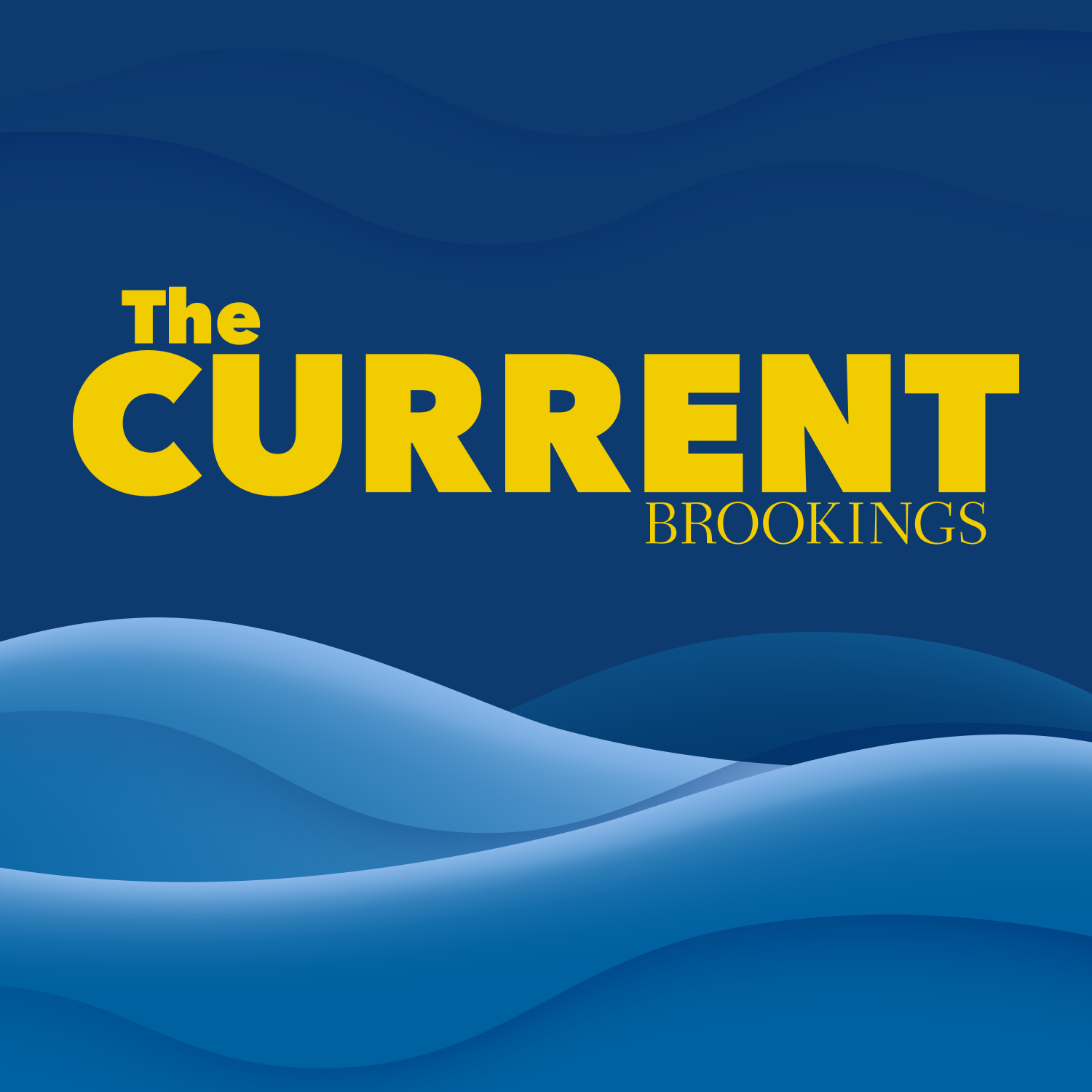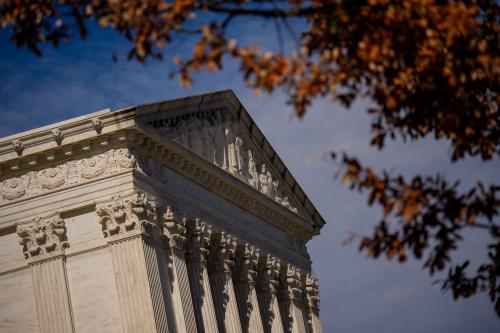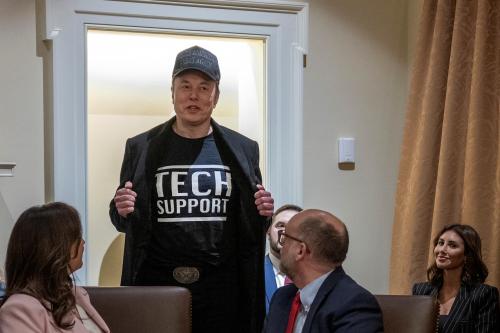On this episode — a look at the shifting landscape of media regulation, consolidation, and the ongoing debate over free speech in the wake of Jimmy Kimmel’s suspension from his late-night talk show and subsequent reinstatement. To talk about these developments, including the role of the FCC in regulating U.S. media in an era of media consolidation, Tom Wheeler, a visiting fellow in Governance Studies and former chairman of the FCC from 2013 to 2017, joins The Current.
Transcript
WHEELER: The federal government is saying to those who are entrusted with using the people’s airways, I’ll help with your economics if you’ll help with my politics.
DEWS: Hi, I am Fred Dews, and you’re listening to the Current, part of the Brookings Podcast Network. On the show today, a look at the shifting landscape of media regulation, corporate consolidation, and the ongoing debate over free speech in the wake of controversy surrounding Jimmy Kimmel’s suspension from his late night talk show.
Joining me to talk about these developments, including the role of the FCC in regulating U.S. media in an era of media consolidation, is Tom Wheeler, a visiting fellow in Governance Studies and former chairman of the FCC from 2013 to 2017.
Tom, welcome to the Current.
WHEELER: Hello, Fred. It’s great to be with you. Thanks for inviting me.
DEWS: Thanks for taking the time. Tom, the FCC has a long history of regulating broadcast content. I believe that’s its core mission. Can you help us understand how the recent actions and rhetoric fit into that history? Is this moment unprecedented?
WHEELER: Well, I think it is a departure from history, Fred, unfortunately. You know, the FCC was created by the Communications Act of 1934. So we’ve been almost a hundred years where the job of the FCC was to promote a diversity of voices in broadcasting and diversity of ownership. And that has been going on for all that period of time until all of a sudden we see the Trump FCC stepping up to say on both issues, first of all, the voices should be voices that please us. And second of all, the ownership we think ought to be concentrated more, and particularly in the hands of people we like.
DEWS: I want to get back to this concentration of ownership in a minute, but first I want to reference FCC Chairman Brendan Carr. I think he’s been in the spotlight a lot more than past FCC Chairman like yourself usually have been. A couple of weeks ago, right after ABC announced that it was pulling Kimmel off the air, following a monologue in which he touched upon Charlie Kirk’s murder and the reaction to it, Carr described on CNBC what he called a massive shift in dynamics in the media ecosystem. And then he said this, let me play it for you.
CARR: And this is a very significant moment because local broadcasters are now pushing back on national programmers for the first time, uh, that I can think of in modern history. And that’s one of the things we want at the FCC. We want to empower local broadcasters that have the public interest obligation to push back on national programmers so that people have more choice. I’ve been clear: we’re reinvigorating the FCC’s enforcement of public interest.
DEWS: Can you unpack what he means by this massive shift in dynamics and the quote, “public interest”?
WHEELER: Sure. We all know that video is not just what comes over the airwaves these days. You know, I grew up in Columbus, Ohio. I had three TV stations when I, when I grew up. It’s a little different today for somebody growing up. And you’ve got the internet, and you’ve got all of the streaming services, a as well as more television outlets.
What’s interesting about Chairman Carr’s comment is while he is absolutely correct that there are big shifts we’re going through right now, it’s also clear that he intends to affect how those shifts are going to happen and affect the content and the consolidation that is part of those shifts.
And, the interesting thing in in that clip is that he talks about the quote, “public interest,” unquote, which is a great concept that is mentioned in the Communications Act. You’re supposed to make your decisions based on the public interest, convenience, and necessity. But it’s not defined. And it’s one of those vague terms that is in the eye of the beholder.
And what Chairman Carr has been doing is defining public interest as things that he and President Trump agree with, and you’re not acting in the public interest if you don’t. This was not the first time that he has put a threat on broadcasters whose licenses depend on the FCC. He was a week into the job, and he posted online “Broadcast licenses are not sacred cows.” We want to make sure they’re following the public interest.
He had also, interestingly enough, said, we probably ought to have a rulemaking of the FCC that defines what this vague term is. I’ll bet you right now we will never see that rulemaking because how can you balance the First Amendment and the public interest of a diversity of voices with the limitation on the diversity of voices that you’re seeing coming out now?
DEWS: I want to also ask you about Chairman Carr’s comment that local broadcasters are pushing back on national programmers for the first time. Who are these quote “local broadcasters,” and aren’t some of them, like Sinclair and Nexstar, pretty big media companies in their own right?
WHEELER: Well, absolutely. So, so you’ve got Sinclair and Nexstar and Gray control the vast majority of broadcast television licenses. Now, you picked up on a key thing, Fred. You’ll always see them referred to by the chairman as “local licenses.” Yes they are. That’s a true statement. They are local licenses. But they are increasingly held by giant corporations.
I think since 2000, the percentage of broadcast licenses held by local owners has been cut in half and is now somewhere around 20%. And so it is companies like Nexstar, Sinclair, and Gray who control what happens in local broadcasting and increasingly the anchors and the coverage in City A is the same as the coverage in City B with a different set of talking heads, because the corporation is dictating, here’s what “local” news will be about.
DEWS: So Tom, with a few large corporations increasingly controlling so many of the nation’s broadcast outlets, does that kind of consolidation make them more susceptible to political pressure? And what effect does that have on free speech?
WHEELER: Absolutely. There is a conflict of interest that exists between the economic interest of the broadcasting chain operation and the need to stand up for the First Amendment and a diversity of voices. And and, you know, an autocrat only needs one ally, and that’s a monopoly story. And if you can control who’s telling that story, you can control what people hear.
And the increasing consolidation of broadcasting, which is about to get even more so with the Nexstar and Tenga merger forthcoming, that creates two things. One, it creates a situation where if you’re the autocrat, you only got a couple of necks to wring. Right? And if you are the the licensee, you know what side your bread’s buttered on and who you need to be making sure you keep happy.
DEWS: Let me back out a little bit, Tom, and ask you to comment on the structure of the FCC and its role, generally speaking. It was created as an independent agency removed from direct political control of the White House as I understand it.
WHEELER: Correct.
DEWS: You were the chairman.
WHEELER: Correct.
DEWS: Can you give listeners a sense of, first of all, who are the commissioners? And how is it meant to operate independently? If commissioners and the chairman are selected by the White House?
WHEELER: They’re selected by the White House and approved by the Congress. And the statute says that the president’s party can only have one more of their five seats. You could have three seats maximum, and there have to be two that are not of the president’s party in order to encourage how do we work this thing out on a on a cross party basis.
Unfortunately, right now, the supposedly five member FCC is three members. And President Trump has not indicated that he has any interest in appointing another Democrat. And so we’re in a situation where you barely have a quorum. The statute says a quorum is three. And and the chairman has great authority. It’s a structure that is called the strong chairman structure because the chairman’s the CEO, and everything that goes on the agenda are things the chairman has said this is what we’re going to worry about. This is how how we’re going to address it.
February 19th, 2025. If you want to talk about a day that’ll live in infamy, President Trump signed an Executive Order in which he removed the independence of the FCC, and said that henceforth everything the FCC considers as well as acts on has to be approved by the White House.
And for over 90 years, the FCC had had independence where the Congress said, no, we created you, you report to us. And the the president, as you said, the president appointed the members, and so you had this level of independence that doesn’t exist today because of the fact that the president has said, I don’t care that Congress said that it needs to be an independent agency. I want everybody working for me.
DEWS: Tom, looking ahead then, how would you recommend or think about restoring that independence of the FCC?
WHEELER: Well, I would hope that Congress would step up and say, no, we created this as an independent agency, and it needs to be an independent agency. But you don’t see that happening with this Congress.
DEWS: Well, final question for you, Tom. Do the recent actions in which this conversation is situated, I mentioned them in the opening, does this signal to you a new phase in the balance between the FCC’s authority and First Amendment protections? What does this mean for the future of free expression, particularly in areas like political satire?
WHEELER: So I fear that what it is saying to us, Fred, is the federal government is saying to those who are entrusted with using the people’s airways, I’ll help with your economics if you’ll help with my politics. And that in so doing it is a violation of the First Amendment, which says government’s not supposed to get into content. It is a violation of the statute that created the FCC, which explicitly says in Section 326 that the First Amendment holds and you will not get involved in content. And I worry about what happens next, particularly when hand-in-glove with this activity, goes the how can we concentrate ownership more amongst our friends?
DEWS: Well, it’s a vital topic, we’re all going to keep paying attention to it. Tom, thank you so much for taking the time to share your expertise with us today.
WHEELER: Thank you, Fred.
DEWS: You can learn more about Tom and his research on our website, Brookings dot edu.
More information:
- Listen to The Current on Apple, Spotify, YouTube, or wherever you like to get podcasts.
- Learn about other Brookings podcasts from the Brookings Podcast Network.
- Sign up for the podcasts newsletter for occasional updates on featured episodes and new shows.
- Send feedback email to [email protected].
The Brookings Institution is committed to quality, independence, and impact.
We are supported by a diverse array of funders. In line with our values and policies, each Brookings publication represents the sole views of its author(s).





Commentary
PodcastWhat’s the FCC’s role in regulating broadcast content in an era of media consolidation?
Listen on
The Current Podcast
September 29, 2025